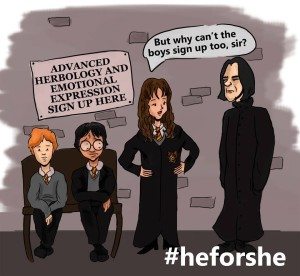#HeForShe doesn’t go far enough
[dropcap]E[/dropcap]mma Watson’s speech to the UN concerning the #HeForShe movement summarises nearly everything I believe as a feminist. She says what I’ve always wanted to say to those people who have passed me off as being just another bra-burning believer in female superiority or criticised me for holding onto an irrelevant issue of the past, and more eloquently than I could too.
That said, while I am entirely supportive of the #HeForShe campaign, I cannot help but feel it fails to go far enough.
The title “#HeForShe“, something which I’ve read into in typical English student fashion, seems the best place to start in explaining this. Having introduced myself as a feminist you might expect I dislike the title because it suggests men are necessary to women’s liberation and equality, yet this is actually what I believe makes the movement so worthy of support.
To finally acknowledge the necessity of male involvement in order for women to reach sexual equality is an aspect of the movement I can only praise. The issues we are now facing in this country are often more related to social discourse than tangible economic or political inequalities which have been successfully fought against in the past, making this invitation to men even more essential.
Instead the problem I find with the title “#HeForShe” is that it fails to correspond with the definition of feminism given by Emma Watson in her speech:
“that men and women should have equal rights and opportunities […] the theory of the political, economic and social equality of the sexes.”
This is the definition by which I call myself a feminist, and I often find it easier to exemplify the implications by way of explanation. Imagine a room in which there is a physically strong male, an equally strong female, a weak male and an equally weak female. Current, sexist, society would argue that only the males could fight one another and that if the strong woman hit the weak man he could not retaliate regardless of their obvious physical inequality.
Feminism, as defined above, would argue everyone should ‘pick on someone their own size’. Judgement based on ability rather than – and regardless of – gender: equality.
This is where I find the campaign falls short. The title, perhaps inadvertently, implies that men are already equal, entitled to all the same rights and opportunities as women, in every aspect of life.
This is not true.
Emma’s speech brilliantly exemplifies many familiar issues such as unequal pay and the sexualisation of women, but the fact she addresses and exemplifies some of the rights and opportunities afforded to females and not males is what makes it such a pivotal moment for feminist discourse.
This moment sees a ‘she’ speaking on behalf of a ‘he’ who’s inequality within social discourse prevents him from speaking for himself. What I mean is that the taboo surrounding men expressing their emotions, a sexual inequality, is preventing men from expressing these feelings of inequality.
Emma exemplifies this when she notes that suicide is the biggest killer of men aged 20 to 49, and emphasising it as a bigger killer than road accidents. This seems shocking to those of us, including myself, who’ve been raised in a sexist society which stereotypically associates men with ‘boy racer’ behaviour more so than with emotions.
Furthermore we are moving into an era where sexual inequalities are becoming more related to the less tangibly social than the material political or economic for both men and women. While there are some ways in which men can clearly be identified as being unequal, such as entitlement to paid maternity leave, the majority of issues facing men are harder to determine.
This, alongside the historical guilt that, in this country, comes from the extremely poor treatment of women in the past has also contributed to the subject of men’s equal rights and opportunities being treated as taboo.
However it is the failure to recognise male inequalities that is now limiting the fight for female equality, the two being interdependent not mutually exclusive.
This is where “HeForShe” falls short. It fails to incorporate the existing ‘SheForShe’ movement most synonymous with feminism and is missing two crucial counterparts: ‘HeForHe’ and ‘SheForHe’, all of which are necessary for achieving the aim of complete and mutual gender equality that is at the heart of feminism.
[divider]
Header Photo: flickr/43527194@N07


Comments (2)
The name will discourage many men. You cannot acknowledge the problems men face, and come up with “Heforshe”. “Where is sheforhe or weforus”